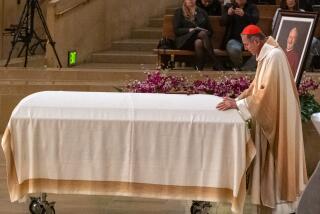Jury Foreman in Caro Case Says Juror Won’t Deliberate
- Share via
Ventura County Superior Court Judge Donald D. Coleman will conduct an inquiry Monday into accusations that a juror in the Socorro Caro murder case is refusing to deliberate.
If Coleman agrees with the complaint from other members of the panel, he may replace that juror with one of four remaining alternates.
A brief hearing on the unusual accusation was conducted late Friday afternoon when Coleman received a note from the jury’s foreman.
“It is my opinion, and that of the others,” the note read, “that the juror in question will not . . . engage in any reasonable deliberations.”
The jury listened to testimony for nine weeks before beginning its discussions of the evidence Tuesday morning.
Charged with three counts of first-degree murder, Caro could face the death penalty if convicted of killing three of her young sons. She has pleaded not guilty and not guilty by reason of insanity.
Attorneys for both sides seemed taken aback by the foreman’s note.
“It appears they’re bordering on a hung jury,” said Assistant Public Defender Jean Farley, Caro’s lead attorney. If that were to occur, the district attorney’s office would have to decide whether to put Caro on trial again.
However, legal experts point to a significant difference between a hung jury, which deadlocks after extensive give-and-take, and a jury hampered by an individual who will not engage in meaningful discussion.
“There’s a difference between refusing to deliberate and refusing to join the others in their verdict,” noted Laurie Levenson, a former federal prosecutor who teaches at Loyola Law School.
“The judge has to be very careful,” Levenson said, citing a pair of decisions made by the California Supreme Court on the issue earlier this year. “He can’t put pressure on a juror to change his or her mind. He can only find out if the juror is capable and willing to perform as a juror.”
Earlier on Friday, jurors asked for two portions of testimony to be read back to them.
One concerned a 10-minute telephone call made by Socorro Caro to her physician husband, Xavier Caro, after the two quarreled on the night of Nov. 22, 1999.
Reaching him at his Northridge office, Socorro Caro was described in her husband’s testimony as agitated and urging him to come back to their Santa Rosa Valley home.
At the end of the call, though, her demeanor changed, according to trial testimony. She became “machine-like,” and, before hanging up on him, told her husband, “That’s what I’ve always admired about you, X, you’ve always known the difference between right and wrong.”
On Friday, jurors again heard that remark--which Xavier Caro said he found so disquieting that he decided to return home.
When he arrived, he found his wife bleeding from a gunshot wound to the head and three of his four sons shot dead in their beds. The Caros’ youngest son, 13-month-old Gabriel, was unharmed.
The other testimony of interest to jurors on Friday was an excerpt from an interview between Xavier Caro and a Ventura County sheriff’s detective hours after the crime.
Speaking to Dan Thompson, Xavier Caro described his last telephone call with his wife. According to the detective, however, the doctor described the remark about knowing right from wrong as “a compliment” from his wife--not vaguely ominous, as he suggested later.
More to Read
Sign up for Essential California
The most important California stories and recommendations in your inbox every morning.
You may occasionally receive promotional content from the Los Angeles Times.










